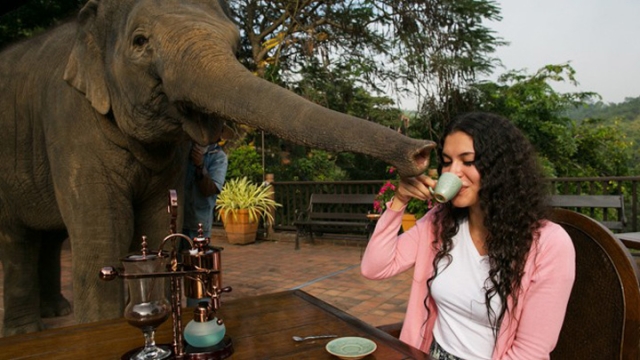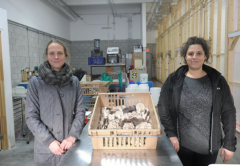[cat shit archrival] Thailand's elephant shit coffee produces less than one kilogram and sells 8000 mosquitoes.

Kopi Luwak produced in Indonesia is one of the most expensive coffee in the world, and the poop coffee produced in Thailand can compete with it for a long time. The shit-like coffee produced in Chiang Mai is very popular with foreign tourists. Due to the complicated production process, demand exceeds supply.
The owner of Meadeng Elephant Camp revealed that he has been producing "Royal Ivory" canned elephant shit coffee for a year, with a price of 36000 baht (about HK $8000) per kilogram of coffee beans. One kilogram can make 142 cups of coffee, and each cup of coffee costs about 1000 baht (HK $2222).
He points out that the production process of elephant shit coffee is complicated, producing only a few hundred kilograms a year, causing the supply of such coffee to fall short of demand. The reason for the low output of shit coffee is that the elephants in charge of production have to be strictly selected. apart from being healthy and painless, they are also adults who have never given birth, and there are fewer qualified elephants. Coffee production is also reduced.
In terms of elephant diet, the coffee beans eaten by elephants are artificially selected and will be mixed with fruit. The coffee beans are digested in the elephant's stomach for three days, then picked out and cleaned by the staff, then dried for another seven days, and finally after eight months of special roasting, the fragrant shit-like coffee can be produced.
Thailand's World Daily
Important Notice :
前街咖啡 FrontStreet Coffee has moved to new addredd:
FrontStreet Coffee Address: 315,Donghua East Road,GuangZhou
Tel:020 38364473
- Prev

Nescafe's Sleep Cafe opens in Japan
According to statistics, Japanese people sleep less than other countries, with an average of one in five respondents saying they always feel sleep-deprived. A marketing activity jointly held by Nestle Coffee and electric bed operators at the former Nestle Cafe, where you can eat in the restaurant, drink a cup of decaffeinated coffee, and then rest on the electric bed, which costs 980000 yen. Enjoy the warmth of eating and sleeping
- Next

Canada: Using coffee grounds to cultivate oyster mushrooms brings good benefits
This is a veritable circular economy, where waste is recycled to increase mushroom productivity while avoiding waste and reducing pollution. Recently, an employee of a mushroom farm in Montreal, Quebec, Canada, introduced when displaying freshly picked oyster mushrooms. It is understood that the mushroom farm cooperates with local cafes all the year round to recycle coffee grounds for mushroom cultivation, and the benefits are good, and it can produce 20 per week.
Related
- Can I make coffee a second time in an Italian hand-brewed mocha pot? Why can't coffee be brewed several times like tea leaves?
- Hand-brewed coffee flows with a knife and a tornado. How to brew it? What is the proportion of grinding water and water temperature divided into?
- What is the difference between Indonesian Sumatra Mantinin coffee and gold Mantinin? How to distinguish between real and fake golden Mantelin coffee?
- What does bypass mean in coffee? Why can hand-brewed coffee and water make it better?
- Unexpected! Ruixing Telunsu lattes use a smoothie machine to foam milk?!
- % Arabia's first store in Henan opens into the village?! Netizen: Thought it was P's
- Does an authentic standard mocha coffee recipe use chocolate sauce or powder? Mocha Latte/Dirty Coffee/Salty Mocha Coffee Recipe Share!
- What is the difference between Vietnam egg coffee and Norway egg coffee? Hand-brewed single product coffee filter paper filter cloth filter flat solution!
- What is the difference between sun-cured and honey-treated coffee? What are the differences in the flavor characteristics of sun-honey coffee?
- How to make Italian latte! How much milk does a standard latte use/what should the ratio of coffee to milk be?

